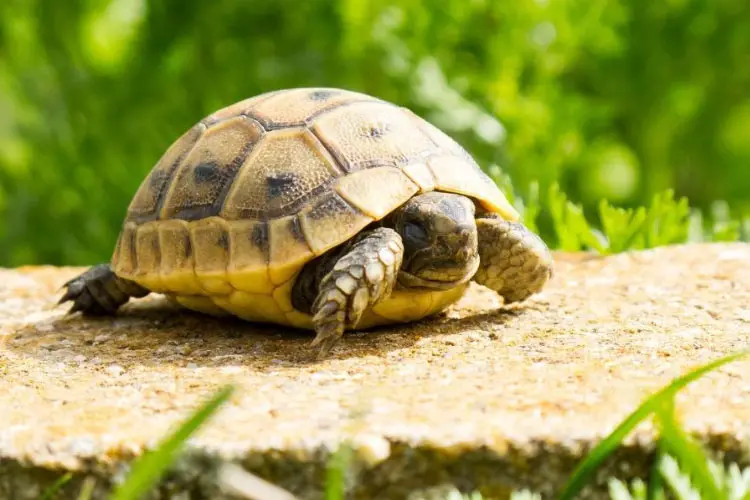Why Is My Turtle Sleeping So Much? How Much Is Too Much?
Your pet turtle, just like any other animal, likes to rest and sleep. But if you find that it’s sleeping more than usual lately, you should get worried as something may not be right.
So, why is your turtle sleeping so much? The main reason your turtle is sleeping so much is due to low water or air temperature. Changes in their environment can also cause your turtle to sleep more. Also, an old turtle tends to sleep more as they become less active with age.
Below, we discuss more details about your little friend sleeping too much, what you can do about it, and additional helpful info on turtle sleeping patterns.
Why is my turtle sleeping so much?
Contents
We have already said that temperature is one of the main reasons your turtle sleeps too much. But there are other possible reasons for this behavior. Let’s discuss each of these reasons below.
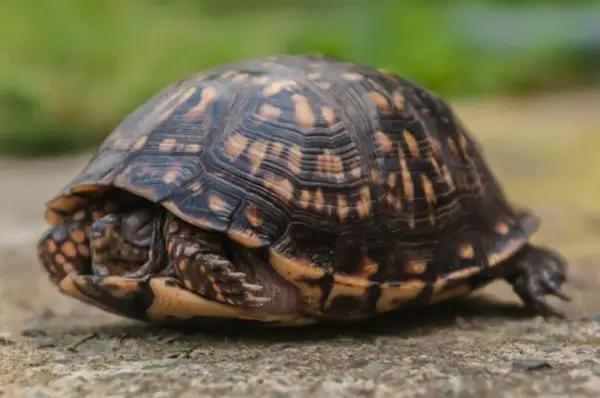
Water temperature
Turtles are highly sensitive to changes in their environment. A drop in water temperature indicates that winter is coming, and they start adjusting their activity levels in readiness for hibernation.
Turtles in captivity are no different. They’ll use the tank water temperature to determine the changing seasons. Thus, if your turtle is sleeping more than usual, you may want to monitor its water temperature more regularly.
A digital water thermometer would be the best way to accurately determine the water temperature.
Generally, you should maintain the tank temperatures at around 76 to84 degrees Fahrenheit (F).
However, the ideal temperature varies from species to species. For instance, common snapping turtles should be kept in a tank with a temperature of 75-80 degrees F. In comparison, red-eared slides will need around 75 degrees F water temperature.
Lack of UVB light
You’ll also need to ensure your turtle has a basking platform with warmer temperatures than other parts of the tank. Basking helps with UVB light absorption and enables the animal to maintain correct body temperatures.
Lack of a basking spot may make your pet feel cold and make it sleep for extended periods. If you already have a basking spot for your turtle friend, make sure the UV light is functioning properly
Age
Age will also influence how much your pet turtle sleeps. If you have a young turtle, it packs lots of energy and stays more active, meaning it will not sleep for unusually many hours.
The same can’t be said for old turtles since they become less active as they get old and may even tend to rest and sleep more.
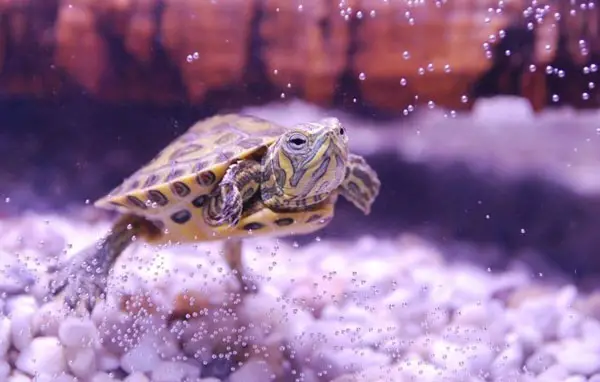
If you find your baby turtle sleeping too much, something might be wrong with them.
Though it might be a simple temperature problem that you can fix, we suggest visiting your vet to find out if your pet is okay or needs medical attention.
Turtle species
Sleeping patterns varies between various species of turtles, so it’s important to understand your specific pet species’ sleep requirements.
If you own a sea turtle, you should keep in mind that it can fall asleep for up to 11 hours but will need to come to the surface to breathe. A turtle resting or sleeping can stay underwater for as many as 4 to 7 hours.
Larger land turtles tend to sleep more than other turtle species. If you own this species, therefore, you may not need to worry as your pet is just at rest or sleeping.
Other things to look out for:
In addition to the above potential causes of too much sleep in turtles, you’d also want to check the following:
- Check the turtle tank: If you have added anything new inside, especially something the pet could eat, get it out of the tank and see if your turtle condition improves.
- Revisit your turtle diet: If you have recently changed your pet’s diet, added something new, or taken away a food item, it might be another potential cause for oversleeping.
- Try to provide them with a balanced diet (including protein pellets, other sources of proteins, and leafy green veggies).
- Examine the substrate: If your tank carries a substrate, examine it to see if your turtle may have eaten it. This could easily lead to blockage in your turtle’s body, sending it into rest and sleep mode.
Also read: Why Is My Baby Turtle Not Eating?
When should you visit a veterinary?
Turtles generally spend a lot of hours resting or sleeping, so you shouldn’t be worried if your pet sleeps a lot.
What if you’re genuinely worried about your turtle sleeping too much? And you feel that something is wrong with your pet? If this is the case, you should consult your vet.
The professional vet can health check your pet to ensure it’s alright and recommend the appropriate temperature and other changes to their habitat.
Why is my baby turtle sleeping a lot?
If you have noticed your juvenile turtle pet sleeping a lot, this is your pet. A baby turtle may sleep a lot due to the wrong tank water temperature or insufficient UVB lighting. A sick baby turtle also tends to sleep a lot.
Baby turtles usually don’t sleep a lot compared to adult turtles. This is because they’re at a stage where turtles have high energy levels and are more active.
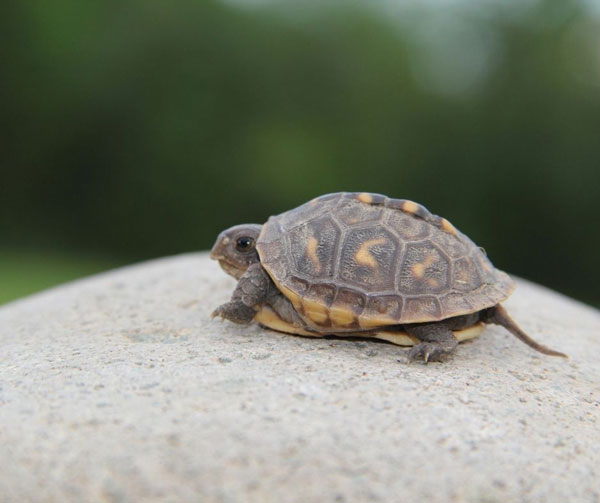
If your pet is new, you could trace the reason behind its sleepiness behavior to the pet store. It could be that the store didn’t keep the pets in an ideal environment and never looked at their health well. This lack of transparency on their part may make you easily buy a sick pet that tends to sleep a lot.
As a new owner, you may also not know how to take care of your new pet. If you don’t give your baby turtle—whether a red-eared slider or box turtle—ideal living conditions and good care, they might fall ill easily.
Do turtles like to sleep?
Yes, turtles like sleeping a lot. Don’t be surprised if you see your turtle sleeping for hours a day. These animals like spending most of their time resting and sleeping.
A healthy turtle will sleep for around 4 to 7 hours every day. If it sleeps less than this, it suffers sleep deprivation and will feel stressed.
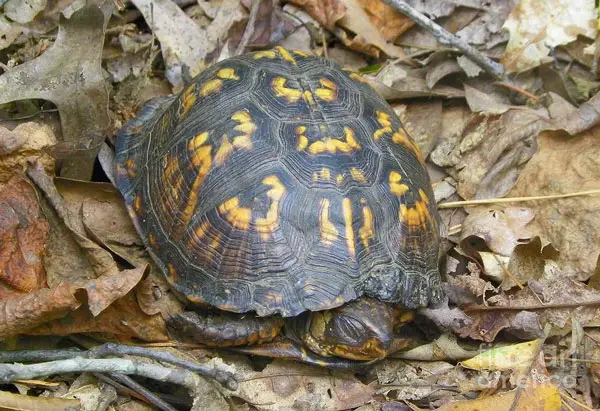
Mind you, turtle sleeping pattern is that they usually sleep during the day and are active and moving during the night. This explains the diurnal or nocturnal activity in most turtle species.
As noted earlier, changes in the number of type activities they engage in and age will significantly affect a turtle’s sleeping patterns.
Where do turtles sleep?
Where your turtle sleeps depends on the species. The sea turtles love sleeping underwater as they’re adapted to these surroundings.
Examples of these turtles include painted and red-eared turtles. They can spend long hours inside the water since they can go without breathing for a long time (up to 5 hours).
Moreover, these aquatic turtles may bury themselves in underwater strictures or inside the frame as a natural instinct to hide away from predators.
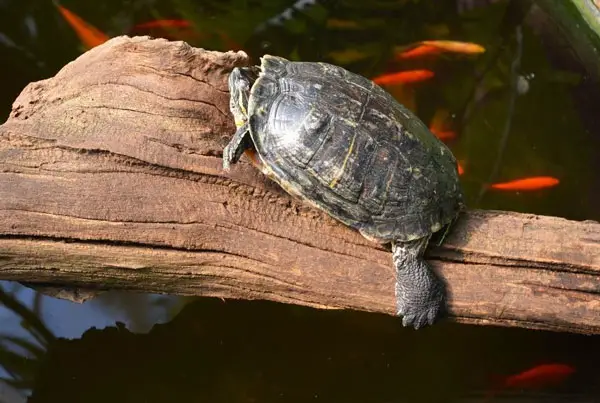
However, some turtle species can’t sleep underwater. A good example is the box turtle which is terrestrial in nature.
Land turtles will most likely sleep in a concealed area, e.g., in a pile of rocks, where they can stay protected.
They might also sleep under leaves or bury themselves in mud, sand, or some dense vegetation that gives them good cover.
Should I wake up my turtle if it sleeps too much?
You can wake up your turtle if it sleeps too much inside its tank. This is important when you want them to feed or to be active by swimming around.
If your turtle is healthy, alternating their water temperature will wake them up.
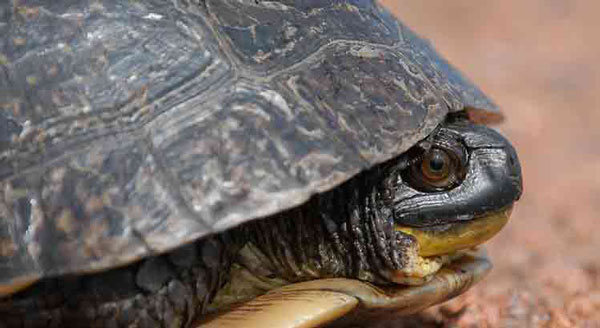
But remember that brumation is a normal and healthy process for these reptiles.
And no matter how much you try to wake them up by alternating the water temperatures, you just won’t get in their way for brumation. After all, nature always finds its way!
FAQs:
Turtles tend to sleep underwater for around 4-7 hours and may only pop up their head to catch a breath. However, some pet turtles may take shorter naps of about an hour during basking, which is completely normal. The exact sleep duration for your turtle will depend on the species, size, age, and even predators.
Most turtle species retract their shells when sleeping to protect themselves from predators. Even though your pet turtle will not be exposed to predators, it will still sleep inside its shell since this is a survival instinct for the animals.
No, a sleeping turtle won’t drown, and you don’t have to worry about something bad happening to it. The turtle can safely sleep underwater for long hours and resurface from time to time when they need some air before going back to sleep underwater.
Related: Turtle Eye Infection
Final Verdict
Next time you find your turtle sleeping too much, don’t panic! The most common reason your pet turtle is sleeping too much could be the water or air temperature being too cold, tricking their body to brumate.
This period is characterized by reduced activity and more resting and sleeping time. It is a completely healthy process and nothing to be worried about.
Other reasons your turtle may sleep more include the turtle species, age, and lack of UV light. Turtles also generally love spending long hours resting and sleeping.
If you think something is wrong with your turtle and causing it to sleep a lot, however, don’t hesitate to consult your vet.


